
Filter News
Area of Research
- Advanced Manufacturing (1)
- Biology and Environment (19)
- Computational Biology (1)
- Computational Engineering (1)
- Computer Science (1)
- Energy Science (19)
- Fusion and Fission (2)
- Fusion Energy (6)
- Isotopes (3)
- Materials (8)
- Materials for Computing (1)
- Mathematics (1)
- National Security (2)
- Neutron Science (4)
- Nuclear Science and Technology (2)
- Quantum information Science (1)
- Supercomputing (9)
News Type
News Topics
- (-) Biomedical (11)
- (-) Clean Water (14)
- (-) Cybersecurity (3)
- (-) Environment (48)
- (-) Fusion (9)
- (-) Hydropower (6)
- (-) Isotopes (5)
- (-) Physics (4)
- 3-D Printing/Advanced Manufacturing (34)
- Advanced Reactors (13)
- Artificial Intelligence (16)
- Big Data (17)
- Bioenergy (17)
- Biology (21)
- Biotechnology (4)
- Buildings (21)
- Chemical Sciences (13)
- Composites (11)
- Computer Science (42)
- Coronavirus (11)
- Critical Materials (12)
- Emergency (1)
- Energy Storage (32)
- Exascale Computing (1)
- Fossil Energy (1)
- Frontier (1)
- Grid (22)
- High-Performance Computing (12)
- Irradiation (2)
- ITER (3)
- Machine Learning (14)
- Materials (36)
- Materials Science (34)
- Mathematics (3)
- Mercury (3)
- Microscopy (11)
- Molten Salt (5)
- Nanotechnology (12)
- National Security (3)
- Neutron Science (27)
- Nuclear Energy (19)
- Partnerships (2)
- Polymers (10)
- Quantum Computing (5)
- Quantum Science (12)
- Security (1)
- Simulation (9)
- Space Exploration (10)
- Statistics (1)
- Summit (8)
- Transportation (36)
Media Contacts
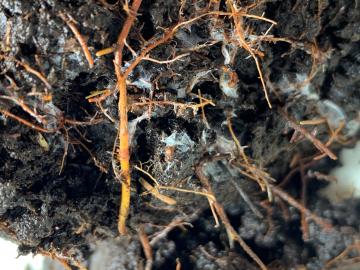
New data hosted by Oak Ridge National Laboratory is helping scientists around the world understand the secret lives of plant roots as well as their impact on the global carbon cycle and climate change.
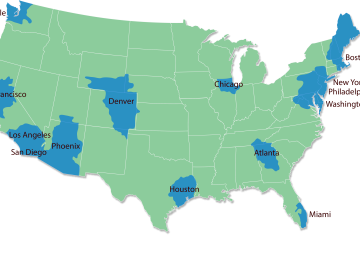
Oak Ridge National Laboratory worked with Colorado State University to simulate how a warming climate may affect U.S. urban hydrological systems.
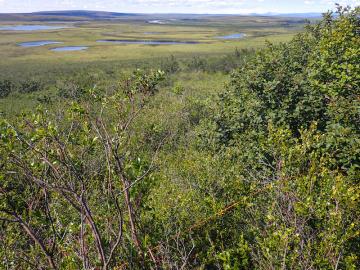
Scientists at Oak Ridge National Laboratory added new plant data to a computer model that simulates Arctic ecosystems, enabling it to better predict how vegetation in rapidly warming northern environments may respond to climate change.
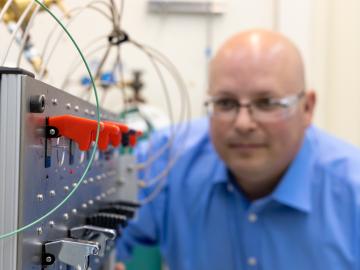
An Oak Ridge National Laboratory researcher has invented a version of an isotope-separating device that can withstand extreme environments, including radiation and chemical solvents.

Equipment and expertise from Oak Ridge National Laboratory will allow scientists studying fusion energy and technologies to acquire crucial data during landmark fusion experiments in Europe.
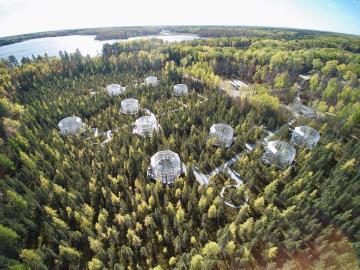
Scientists studying a unique whole-ecosystem warming experiment in the Minnesota peatlands found that microorganisms are increasing methane production faster than carbon dioxide production.

Researchers at Oak Ridge National Laboratory have identified a statistical relationship between the growth of cities and the spread of paved surfaces like roads and sidewalks. These impervious surfaces impede the flow of water into the ground, affecting the water cycle and, by extension, the climate.
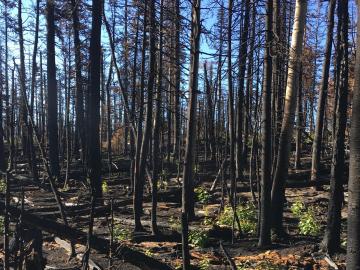
An Oak Ridge National Laboratory research team discovered that aspen saplings emerging after wildfire have less diverse microbiomes and more pathogens in their leaves, providing new insights about how fire affects ecosystem recovery.
A study by Oak Ridge National Laboratory, the University of Copenhagen, the National Park Service and the U.S. Geological Survey showed that hotter summers and permafrost loss are causing colder water to flow into Arctic streams, which could impact sensitive fish and other wildlife.
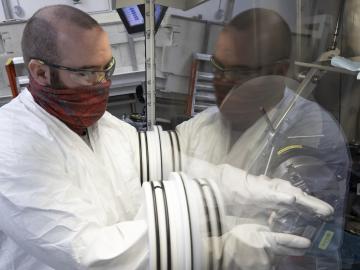
A better way of welding targets for Oak Ridge National Laboratory’s plutonium-238 production has sped up the process and improved consistency and efficiency. This advancement will ultimately benefit the lab’s goal to make enough Pu-238 – the isotope that powers NASA’s deep space missions – to yield 1.5 kilograms of plutonium oxide annually by 2026.


